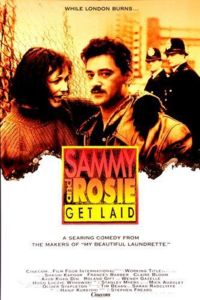

(1987) was Hanif Kureishi's second screenplay,
and like his first, My Beautiful Laundrette (1985) was directed by Stephen
Frears and produced by Tim Bevan. This collaboration, however, was different.
Its costs were much greater and it failed to make a profit. It met with more
mixed reviews: its main flaws were a lack of focus and a fragmented and
didactic storyline. Finally, its first theatrical release took place not in
Europe (where Laundrette had been a sleeper hit), but in the United States,
where there was a much higher expectation of box office success.
Images of London dominate both the script and
the visual landscape of the film. While making the film, Kureishi wrote in his
published diary, "My love and fascination for inner London endures. Here
there is fluidity and possibilities unlimited." When Rafi (Shashi Kapoor)
urges his son to move to Pakistan, Sammy (Ayub Khan Din) narrates over a
montage of locations from the towpath toward Hammersmith, past the Albert Hall
and Royal Court Theatre to the ICA. Here Kureishi emphasises the
cosmopolitanism of Sammy's true "homeland".
However, the 'ideal', romantic, even utopian
vision of 1980s London that Sammy imagines is in stark contrast to the dismal,
hopeless reality of the burning wasteland of the streets outside. Kureishi's
London is rent by contradictions between assimilation and separation,
conservatism and liberalism, and tradition and progression.
Against a backdrop of homelessness, racial
hatred and squalor, the voice of Margaret Thatcher praises prosperity; Sammy
and Rosie live on a middle-class street on the edge of a war zone; and while
interracial love and extra-marital sex may be a social breakthrough, it is
inarticulate, unfulfilling, and ultimately a pursuit of freedom for freedom's
sake. We see each of the three couples in a visually striking triple,
horizontally-split scene, one pair on top of each other, inhabiting a separate
setting, experiencing the same hollow satisfaction of sexually-driven
adulterous affairs.
Kureishi called the film his "declaration
of war on the British establishment". For all its attempts at an original
portrayal of gender, class, race, politics in Thatcher-era London, its main
flaw was that this "declaration" was too self-conscious, too
transparent, and insufficiently contextualised. It was its all-too-obvious
attempt at hipness that left it open to ridicule, while its obsession with sex
was a complaint of more than just conservative critics.
Shalini Chanda
©screenonline.org.uk/film/id/476121/index.html
Academic
year 2008/2009
©
a.r.e.a./Dr.Vicente Forés López
© Giuseppe Improta
imgiu@alumni.uv.es
Universitat de València Press